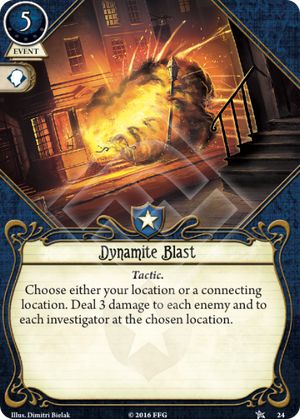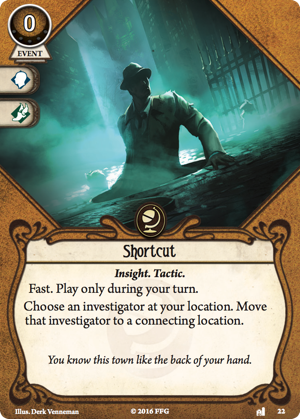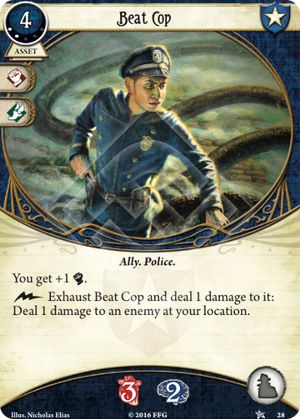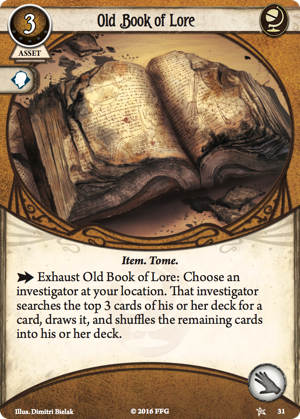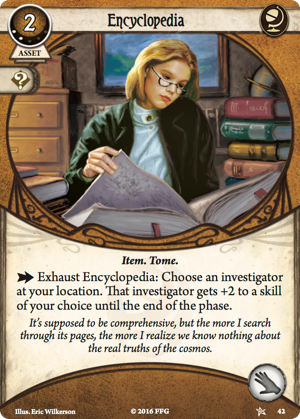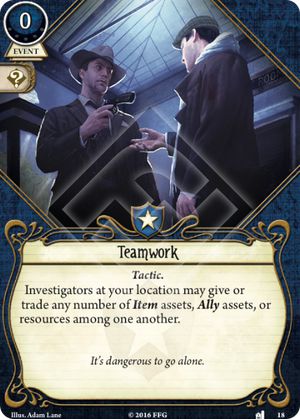Hello again dear readers! After discussing all currently
available investigators I figured out it might make sense to share some of my
thoughts about successfully pairing them1 in (well) functioning
duets. Not only it’s an interesting topic, but also I have seen the question
popping up on different forums.
Usually the dilemma concerns only the choice of
investigators. Sometimes, however, on top of a perfect choice of investigators
you must also accordingly fine tune their decks. Obviously, some investigators
are more flexible, while others have more limited scope.
Generally speaking, playing in a team encourages
specialization. Instead of taking less efficient neutral cards (or filing
out-of-the-class slots) to somehow mitigate the weak sides, it’s better to
focus on your strengths and allow the fellow investigator to cover your weak
spots. This is obviously only a general statement and full specialization might
not always be the best idea (more about it in the appropriate sections).
So back to the original question – what duets work best at
uncovering the terrible truths, preventing mankind’s demise and dealing will
physical, mental and emotional threats? The answer is not straightforward (if
it was, what a shame it would be, we love the game for the complexity, don’t
we?2), we should consider multiple factors when matching the
characters.
1. Area of focus
In
other words – what would the investigator do in the game? There are two main
specializations – dealing with monsters and discovering the clues. You can
divide these tasks in different ways. You can pair a specialized fighter (like
Zoey, or Jenny with a “fighter build”) with an investigator focused on clue
collecting (like Rex or appropriately customized Pete). You can also divide the
tasks more evenly (60:40 or so) and match for example an investigating-heavy
deck of Jim (with just a couple of cards for fighting) with a combat-oriented
Roland (still throwing in Evidence, Deduction and such). You might consider a
fair split as well, for instance – Agnes paired with Jenny (in this situation
consider using all the non-Green slots for investigation-related cards).
A
specialized approach makes it easier to use character’s full strength and
enables you to take as few suboptimal cards as possible. On the other hand, it
also strongly discourages splitting the team, which might lead to suboptimal
in-game choices. The more balanced team might on the other hand suffer, when a
particularly tough task is to be performed. A high-shroud location or a boss
enemy might prove to be a difficult task and for sure will require full focus
of both team members.
Even
if you decide to go with a heavily specialized approach, please leave some
space in the deck for the other area. There’s barely anything more annoying
than walking around with nothing to do, just because no enemy showed up. Well,
actually there is – being eliminated because too many enemies showed up and
your team mate didn’t manage them all.
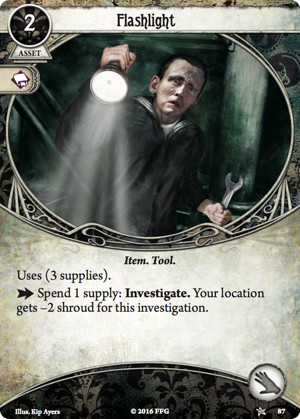 |
| As of now it's the only asset rogues can take to investigate better. That's why they don't make strong clue collectors and probably never will. |
One
or both of the investigators can (and even should) stock on some support cards
– healing, card drawing etc. I recommend to bear in mind the specific needs of
the team partner when deciding what support cards to take. Is their deck slow?
Old Book of Lore will come in handy! Is he/she in need of Sanity healing?
Liquid Courage might prove to be very useful! Sometimes taking a card that only
our partner benefit of is a very reasonable choice.
2. Luck/draw dependency
Some
of the investigators just need the correct card to properly do their job. When
left without them, they are powerless. The card engine is essential for them
and the player can be easily doomed by not getting the right set of cards.
Prime example might be Rex, heavily relying on abusing Scavenging or Agnes, who
needs spells to get any job done.
Meanwhile,
there are some who can handle work properly just getting any help – whenever
Zoey gets a Beat Cop, a weapon or just even a Cross, she’s ready to inflict
God’s wrath on the enemies.
Similar
situation applies to the Chaos Bag. Some investigators (particularly
specialized ones) will regularly attempt skill checks being much over the
difficulty level, while others try to gamble and play the odds. As an example
of the latter category, Jim comes to the mind, as well as pretty much every
Survivor character. Jenny, with her rather balanced skill values is also
slightly tilted towards odds-playing.
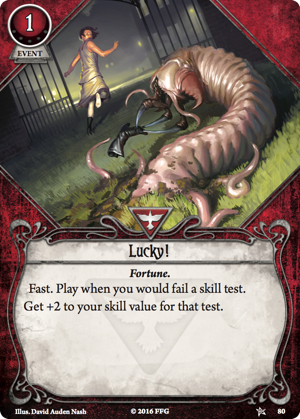 |
| The ultimate push-your-luck card. And what an awesome graphic! |
You
should try to have at least one risk-averse investigator in the duet. Otherwise
you are just asking gods of (un)fortune to punish you for your recklessness. On
the other hand the conservative approach, while potentially safer, might not
provide good enough of an edge against the toughest scenarios, so a bit of daring
is always welcome (and if it fails you can always blame the bad luck!).
3 3. Tempo
Another important (and easily overlooked) aspect is tempo.
Some characters/decks are naturally slow – they need to play assets, generate
some sort of economy, gather resources etc. before they ARE ready to face the
supernatural threats. Prime examples of such investigators are Agnes and Jenny.
The first one needs to get the spells (or at least the alternative assets, like
Fire Axe), the second one needs to get the costly assets and hopefully talents,
as well as resources to spend on the talents.
On the other end of the spectrum there is Pete, who is
basically ready to go turn 0, as well as Jim, who can just equip Grotesque
Statue or Ritual Candles and can already test his luck. As Jim’s example shows,
being a “rush” investigator does not mean not being luck dependent.
In the middle of the spectrum we can find Daisy or Zoey, who
need to get an asset or two, but not an entire library/arsenal.
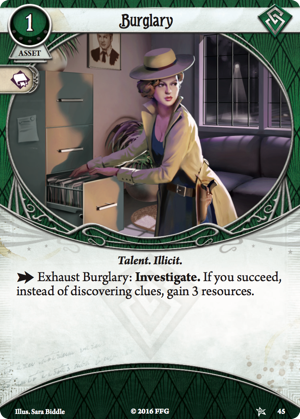 |
| This is arguably the iconic "slow" card. Starts paying off in 3rd action. |
I strongly advise to balance this aspect as well. Using two
slow decks might lead to being overrun in the beginning. You might have more
chances with 2 “aggro” decks, but if they do not clear the scenario quickly
enough, you might find your characters unable to cope with the challenges and
knocked down/driven insane.
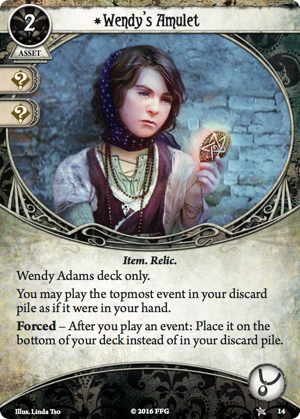 |
| The Amulet gives Wendy some options to transition into a decent end-game character. |
. 4. Class
It might strike some controversy, but I don’t believe it is
a necessary thing to avoid “overlapping” classes. Obviously forming a team of
two investigators of the same class might lead to breaking one of the above
mentioned rules (particularly the first one, but two Survivors might easily be
too “aggro”, while two Mystics too luck dependent etc.). However, you shouldn’t
be afraid of having some cards of the same class (unless you simply hit the
physical limitation) nor strive to include as many classes as possible for the
sake of variety. The only thing you should be conscious about is the unique
assets. I strongly recommend not using the same unique card in two decks.
5 5. Development
This is not really a separate criterion, but more of a thing
to keep in mind when pairing the investigators. During the course of a campaign
you will get high level cards, which will further shape your deck. It may shift
the focus of the investigator, change deck’s tempo etc. Please bear it in mind
during both character selection and the initial deck creation.
You might start bit unbalanced in some of the aforementioned factors, planning to make adjustments on the way. Obviously you must still be able to cope with first scenario(s).
You might start bit unbalanced in some of the aforementioned factors, planning to make adjustments on the way. Obviously you must still be able to cope with first scenario(s).
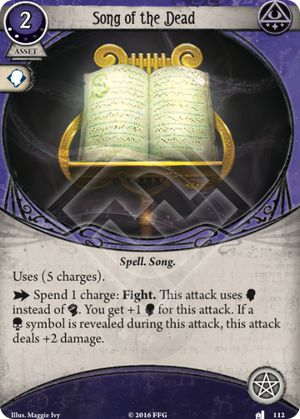 |
| Adding extra copies of Fight spells can turn your Mystic into the main fighter. |
Same principle applies to choice of support card. As an
example consider Zoey paired with Daisy. Zoey should plan to take Brother
Xavier (or at least heavily consider it) to cover for Daisy’s fragile physique.
Therefore knowing her Will is about to be boosted, she should consider taking
Rite of Seeking for the clue-gathering (instead of taking Flashlights, for
instance). In other words – team needs that will be addressed by upgraded cards
should already be taken into account during creation of the starting deck.
All images are courtesy of cardgamedb.com and fantasyflightgames.com
1Same approach should also work with future
investigators, unless they will be too different. However the points I’m
raising are abstract and high-level enough to (hopefully) cover the topic for
good. Obviously, I am only using currently published investigators to
illustrate my points.
2AH:TCG is a fairly complex game. While it might
lack the depth of so called “euro” games, it provides the player with lots of
options. The number of options will significantly grow with future releases –
both due to the growing card pool and possibly new mechanics. I believe we can
expect new ideas to be introduced, based on FFG past approach.
Obviously more complex does not mean better. There is a sweet
spot and it’s different for every player. By complexity, I mean what BGG
describes as “weight” https://boardgamegeek.com/wiki/page/Weight).

